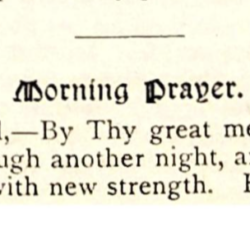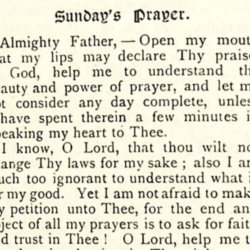| Contribute a translation | Source (English) |
|---|---|
Prayer of thanksgiving. | |
My Father,— I thank Thee for all the blessings which Thou hast granted to me. I am young, and it is a beautiful, a lovely thing to be young. O help me to use my youth in such a way as to prepare me for my life hereafter. | |
O Lord, I cannot know what is in store for me, but Thou hast taught me to put my trust in Thee, and therefore I do not feel afraid. | |
Lord, whether in the future I marry or whether I remain single, I shall be able to lead a useful, happy life. I thank Thee for having made this possible for me. | |
Lord, Thy glorious light is within my reach, and if I remain true to Thee and true to myself, life loses its terrors, and when the end draws near, I hope to face it with calm and trustfulness. Thou hast blessed my life with the beings whom I love, and to whom I know I am very dear. Oh, let me never cause them pain. | |
Lord, Thou hast allowed me to inherit Thy glorious Law, and to obey its beautiful precepts. Thou hast given me wisdom to understand that what is most pleasing in Thy sight is a pure and trusting spirit. Thou art the God of righteousness, and Thou hast taught me that the end and object of my life must be to do right for right’s sake. | |
Lord, I thank Thee for my womanhood! Let me never do anything to disgrace it. Help me to develop all its powers, so that I may become gentle, truthful, brave, loving, and honourable, and be able to influence all around me for good. | |
Lord, I thank Thee for having kept me alive to witness signs of Thy never-ending love. | |
In Thine hand it is to make great, and to give strength unto all. Now therefore, our God, we thank Thee and praise Thy glorious name. (1 Chronicles 29:12-13) |
“Prayer of Thanksgiving” was written by Lilian Helen Montagu and published in Prayers for Jewish Working Girls (1895), pp. 6-7. This prayer reads to me as possibly intended to be used as a prayer of transition, before the tradition of the bat mitsvah was universally adopted, at a time when a young woman might be old enough to begin contemplating their future, their marriage prospects, and their general “usefulness” — especially in regards to their future work — the overarching theme of this collection of prayers. This affirmation in particular stands out to me as radically important for Lilian Montagu and other young suffragettes to express in 1895: “Lord, whether in the future I marry or whether I remain single, I shall be able to lead a useful, happy life” and “Lord, I thank Thee for my womanhood!” –Aharon Varady
Source(s)


“Prayer of Thanksgiving, by Lilian Helen Montagu (1895)” is shared through the Open Siddur Project with a Creative Commons Public Domain Dedication 1.0 Universal license.










Leave a Reply